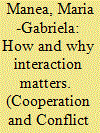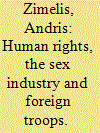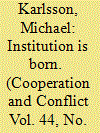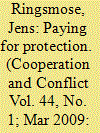|
|
|
Sort Order |
|
|
|
Items / Page
|
|
|
|
|
|
|
| Srl | Item |
| 1 |
ID:
086553


|
|
|
|
|
| Publication |
2009.
|
| Summary/Abstract |
The aftermath of the Cold War has brought a shift in the West's position on the acceptance and promotion of international human rights standards in developing countries. In this context, the Association of Southeast Asian Nations (ASEAN) member countries challenge the West's position based on two contradictory principles - comprehensibility and cultural embedment of human rights. In this article, I argue that interactions with regard to human rights involving state and non-state actors in ASEAN have become part of the process of regional identity formation. How ASEAN has responded to external pressures in terms of compliance with international human rights norms, and how it has developed its own normative and procedural approach to human rights at the regional level, are inherent in the dynamics of `Self' definition. A mixed pattern of `rhetorical' and `communicative action' explains how interaction has led to different phases - differentiation, affirmation, contestation and re-orientation - in the dynamics of `Self' definition of ASEAN with regard to human rights.
|
|
|
|
|
|
|
|
|
|
|
|
|
|
|
|
| 2 |
ID:
086554


|
|
|
|
|
| Publication |
2009.
|
| Summary/Abstract |
This article explores the relationship between prostitution, nationalism and foreign policies using a feminist analysis framework. Although scholars have dealt with the theoretical role of women in nationalist projects, there is little work factually supporting these theories. There is also a paucity of works demonstrating the role of prostitution in national security policies. This article rectifies these shortcomings and demonstrates that, although prostitution is illegal in Japan, South Korea and the Philippines, these governments have played an active role in supporting and maintaining the prostitution industry geared at servicing US troops. The US troops, in turn, have protected the national security of each of these countries for all of the post-Second World War era. In this context, it seems clear that `national security' does not include the physical, economic, legal and social insecurity of Japanese, Korean and Filipino women despite their contribution to the most quintessential Realist policy - national security.
|
|
|
|
|
|
|
|
|
|
|
|
|
|
|
|
| 3 |
ID:
086552


|
|
|
|
|
| Publication |
2009.
|
| Summary/Abstract |
Lithuania's formation of a counter-terrorism institution after 9/11 sheds new light on three premises often associated with the study of institutional formation. First, while the distinction between the creation phase and the operation phase is logical, the appearance of extra-institutional guidance suggests that established institutions within other domains (e.g. military security) can temporarily fill an institutional vacuum (counter-terrorism). Second, the dynamic between agency and structure is readily seen, but in this case it was quite clear that agency was strongly dependent upon changes in some of the structural contexts (threat of terrorism, international institutions, age of the security state). Third, the role of sequencing and timing turned out to be more important than expected. There was a strong temporal order between the sequences of the formation phase and a significant spillover from two contemporary security processes (preparations for NATO membership, reforms of the security state).
|
|
|
|
|
|
|
|
|
|
|
|
|
|
|
|
| 4 |
ID:
086555


|
|
|
|
|
| Publication |
2009.
|
| Summary/Abstract |
Since the creation of the Atlantic Alliance in 1949, the Alliance's minor partners have persistently spent a smaller share of their Gross Domestic Product (GDP) on military measures than their larger brothers-in-arms do. Taking my cue from collective goods theory, I examine the factors shaping the armament behaviour and military spending patterns of the smaller allies. The article's main theoretical argument is that the smallest among allies tend to perceive their military instruments as the price of admission to a collective defence organization upheld by larger and more potent powers. In essence, military spending becomes the price of security guarantees and protection. Consequently, small allies raise their military expenditures when their security-guaranteeing senior partner threatens with sanctions that the small ally considers more costly than the requested increase in military expenditures and not as a response to rising threats. In the second section of the article, this theoretical claim is illustrated and assessed against Denmark's Cold War defence policies. The empirical findings corroborate the belief that the small allies' leading policy-makers view their armed forces as a necessary evil maintained in order to profit from their senior partners' capabilities.
|
|
|
|
|
|
|
|
|
|
|
|
|
|
|
|
|
|
|
|
|